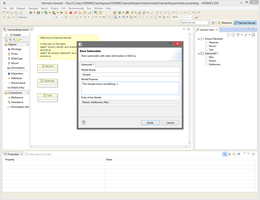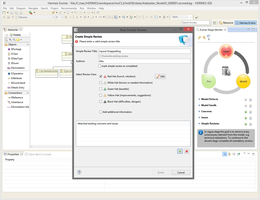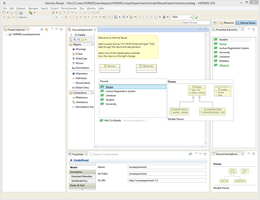Frequently Asked Questions
Why is my welcome screen white?
This can happen on Linux machines. Have a look at: Welcome White?
HERMES does not respond? Why?
We ship HERMES as an unzip and not as an installer version. Hence, HERMES takes quite some time during the first start to figure things out and configure itself. The start up time decreases with the second start.
Why does HERMES start so slowly?
Have a look at: "HERMES does not respond? Why?"
Why does HERMES demo throw Exceptions?
We configured our demo with a build in setup which does quite a lot of nasty things, so we can assure you gain the same results every time you start from the welcome page. Unfortunately, this leads to some exceptions which cannot occur in real life deployments.
Why does the search box disappear immediately?
We found that issue on Linux machines some time ago and could verify it. Recently on recent machines this issue does not occur any more.
Is there a more recent version of HERMES for Mac available?
Short answer: Yes. Long answer: We need to build it individually for you, because we have no testing environment for Mac OS. Just drop us a line and we will happily provide a version for you. Please do not forget to mention your exact OS and Java platform (32 or 64 Bit)
How can I configure HERMES?
Have a look at the properties under the Hermes section. You will find everything you need.
How does HERMES do things?
You can either look at our publications, try to investigate the source code or contact us. We will be happy to answer any questions you might have. Make sure that you have an HERMES SDK at hand, because most likely we will point to some source code. Simply enable the plug-ins perspective and import the plug-ins we are talking about "as source code". We can do so, because our HERMES SDK ships all source code.
Can I get access to your repository?
Of course, you can. Just drop us a line. Other than that, our HERMES SDK already includes everything you might need. Have a look at "how does HERMES do things?".
Are you making money with this?
No. It is all free and we have put everything under Eclipse Public License (EPL).
Can I donate anyway?
No. This is a former research project and now fun project. At the moment, there is no intention to make any money with HERMES.
Any chance you will port the remaining Eclipse 3 parts to the Eclipse 4 platform?
Yes, we are working on HERMES 2.0, which will avoid the compatibility layer completely, i.e., it will have no more direct interaction with Eclipse 3 mechanism.
Is there a roadmap?
Right now, there is no roadmap. But by early 2017 there will be one.
Are there other recommender strategies available?
At the moment we distinguish between public and private recommende strategies, because some companies want to keep their implementations private. So, right now the publicly available recommender strategies are all shipped with our demo and SDK. But companies are coming around and offer their recommener strategies; still, it takes time.
Are there other model repositories available?
We are working on a serious set of models and our ecorehub will provide a reasonable set some time in the second quarter in 2017. At the moment, there are some IP issues, which we need to figure out.
-
This video shows the basic functionality how models can be stored into a model library. The process takes "known" parts into account and links them to the newly stored.
-
This video shows how the evolution approach assesses model quality and offers a staged approach that guides model quality.
-
This video shows how models can be "applied", i.e., reused. They are loaded from a model library and inserted into the open editor. Several libraries and several editors are supported.








